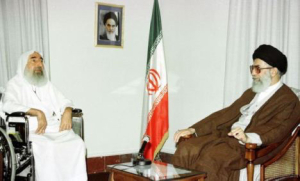Prime Minister Yitzhak Rabin’s Reasons for Signing the Oslo Accords

(November 1, 1995)
Three days before he was assassinated on November 4, 1995, Israeli Prime Minister Rabin told his speech writer Yehuda Avner, why he recognized the PLO and Yasir Arafat. That recognition came in the exchange of letters between Rabin and Arafat on September 9, 1993, four days before the Oslo Accords were signed. Rabin despised Arafat: he did not trust him because he witnessed up close the PLO leader spending a lifetime killing Israelis and Jews; through violence Arafat constantly sought to undermine Israel’s existence. However, Rabin was a pragmatist. He preferred at this juncture to bolster Arafat’s secular oriented PLO stream of Palestinian nationalism to the theologically dominated Hamas, supported in part by Iran. Rabin believed that failure to bolster the secular stream in the Palestinian national movement would only elevate Hamas. Further, Rabin believed a secular national conflict over territory could be resolved but a Jewish-Islamic theologically based conflict would go on for decades. Rabin could not foresee how Arafat’s PLO and the Palestinian Authority’s governance would evolve into a kleptocracy where West Bank and Gaza Strip Palestinians would be dominated by autocratic rule. He could not see that the PLO and the PA would be so administratively inept that Hamas would wrest control of the Gaza Strip in a coup d’etat in June 2007, and dominate Palestinian politics there for at least the next fifteen years.
Rabin’s fear about Iran was correct; it would continue to provide massive logistical, financial, and philosophical support to Hamas. According to remarks by Hamas leader Yahya Sinwar in May 2021 “Our complete gratitude is extended to the Islamic Republic of Iran, which has spared us and the other Palestinian resistance factions nothing in recent years. They have provided us with money, weapons, and expertise. They have supported us in everything.” Rabin was prescient about Iran but he might have been surprised at the level of genocidal hatred that Iran would disseminate against Israel over the subsequent quarter century. Rabin misread Arafat’s intentions to lead the Palestinians toward greater self-rule, and perhaps something beyond that politically. The Oslo Accords did provide Israel with enormous economic and trade openings to India, the Far East and the rest of the world, but they did not unfold a more peaceful relationship between Israel and the Palestinians. Responsibility for that shortfall remains in many places.
Ken Stein, November 4, 2023
Question from the author: Yehuda Avner: Why did you shake Arafat’s hand?
Rabin: “Number one: Israel is surrounded by two concentric circles. The inner circle is comprised of our immediate neighbors—Egypt, Jordan, Syria, and Lebanon, and, by extension, Saudi Arabia. The outer circle comprises their neighbors—Afghanistan, Iran, Iraq, Sudan, Yemen and Libya. Virtually all of them are rogue states, and some are going nuclear.
Number two, Iranian-inspired Islamic fundamentalism constitutes a threat to the inner circle no less than it does to Israel. Islamic fundamentalism is striving to destabilize the Gulf Emirates, has already created havoc in Syria, leaving twenty thousand dead, in Algeria, leaving one hundred thousand dead, in Egypt, leaving twenty-two thousand dead, in Jordan, leaving eight thousand dead, in the Horn of Africa—the Sudan and Somalia—leaving fourteen thousand dead, and in Yemen, leaving twelve thousand dead. And now it is gaining influence in the West Bank and the Gaza Strip.
Iran is the banker, pouring millions into the West Bank and Gaza in the form of social welfare and health and education programs, so that it can win the hearts of the population and feed religious fanaticism.
Thus, a confluence of interest has arisen between Israel and the inner circle, whose long-term strategic interest is the same as ours: to lessen the destabilizing consequences from the outer circle. At the end of the day, the inner circle recognizes they have less to fear from Israel than from their Muslim neighbors, not least from radicalized Islamic powers going nuclear.
Number three: the Arab-Israeli conflict was always considered to be a political one: a conflict between Arabs and Israelis. The fundamentalists are doing their level best to turn it into a religious conflict—Muslim against Jew, Islam against Judaism. And while a political conflict is possible to solve through negotiation and compromise, there are no solutions to a theological conflict. Then it is jihad—religious war: their God against our God. Were they to win, our conflict would go from war to war, and from stalemate to stalemate.
And that, essentially, is why I agreed to Oslo and shook hands, albeit reluctantly, with Yasser Arafat. He and his PLO represent the last vestige of secular Palestinian nationalism. We have nobody else to deal with. It is either the PLO or nothing. It is a long shot for a possible settlement, or the certainty of no settlement at all at a time when the radicals are going nuclear.”
November 1, 1995